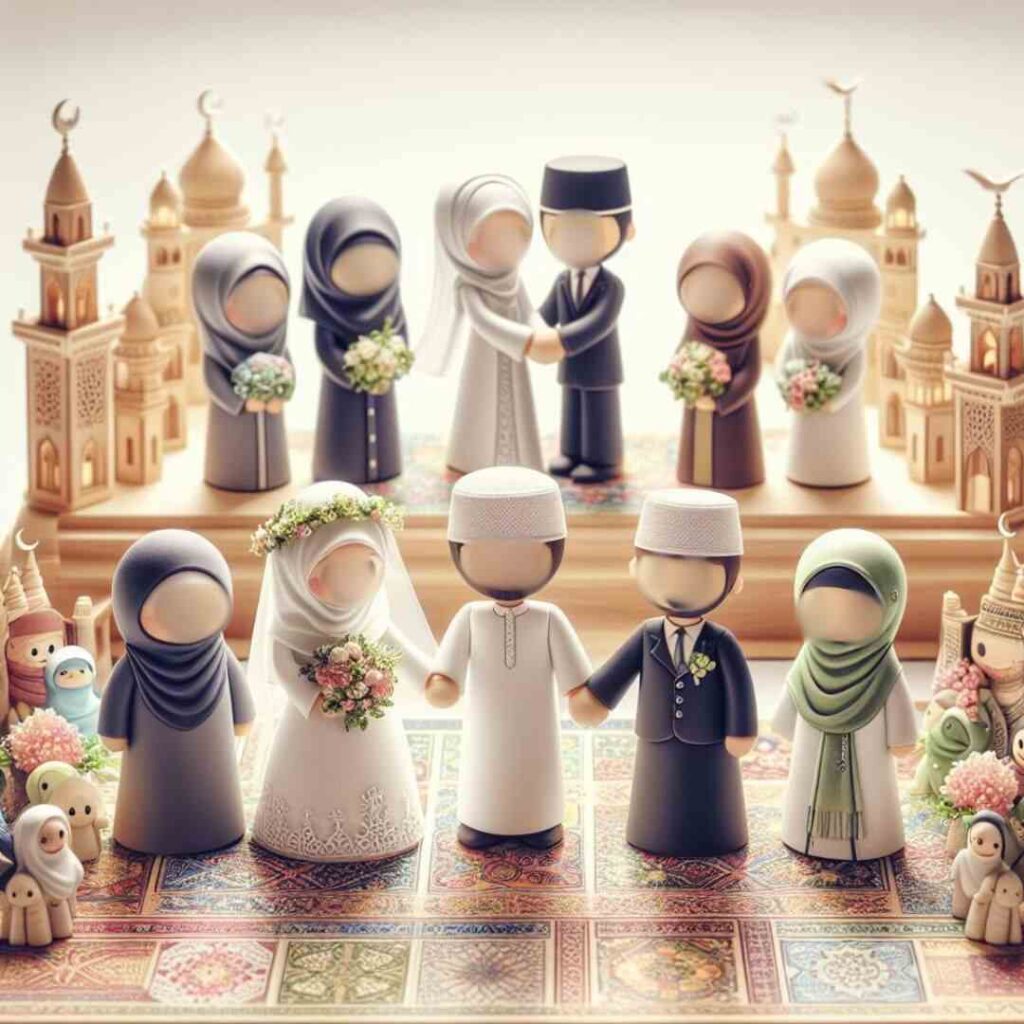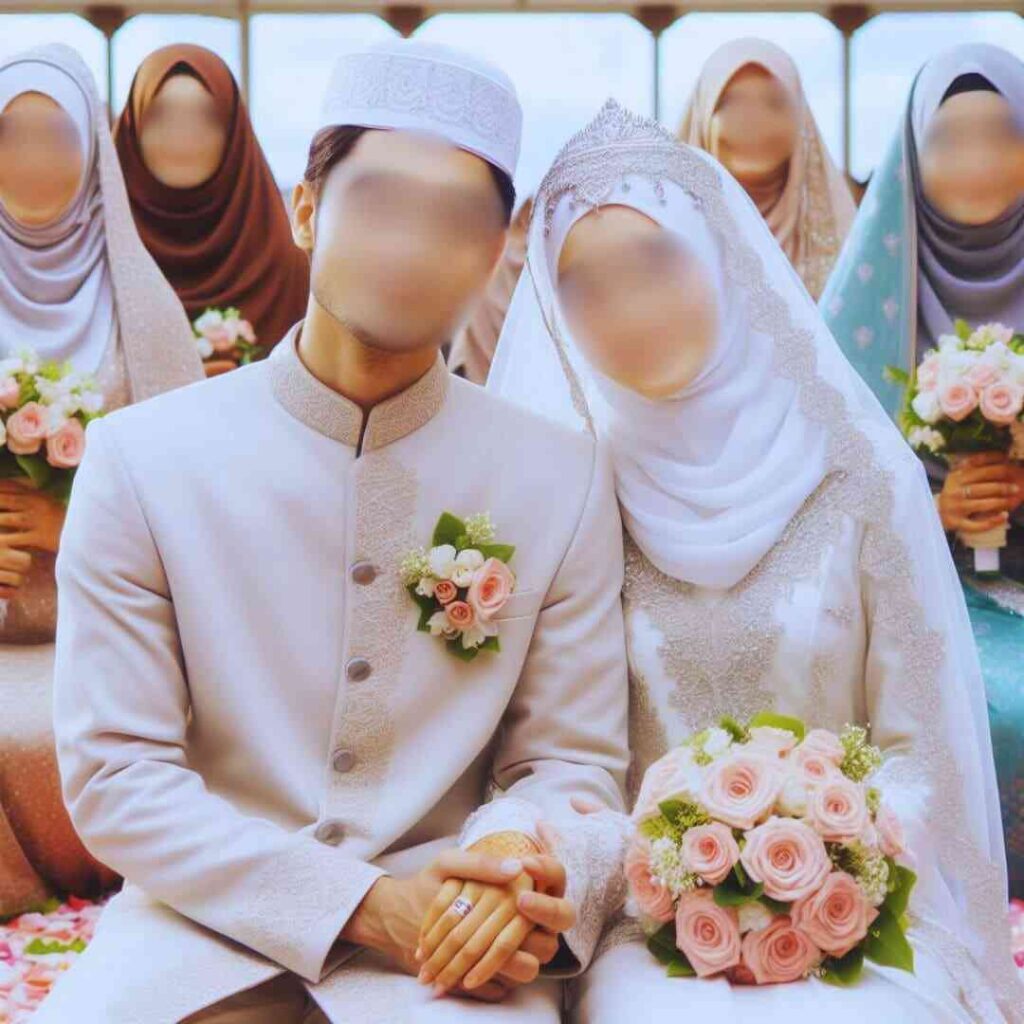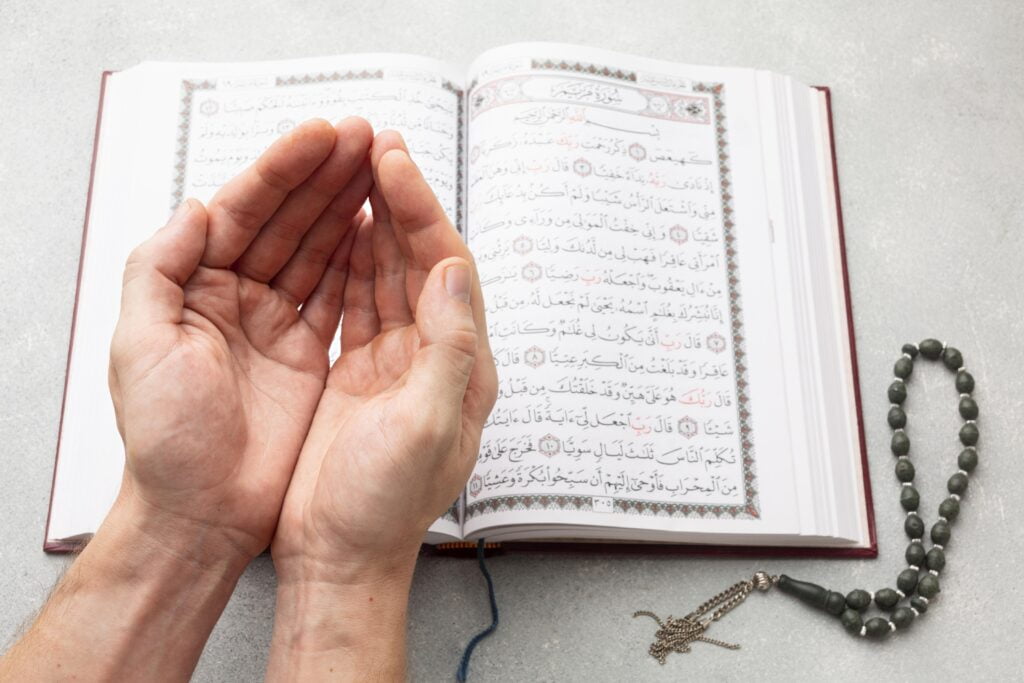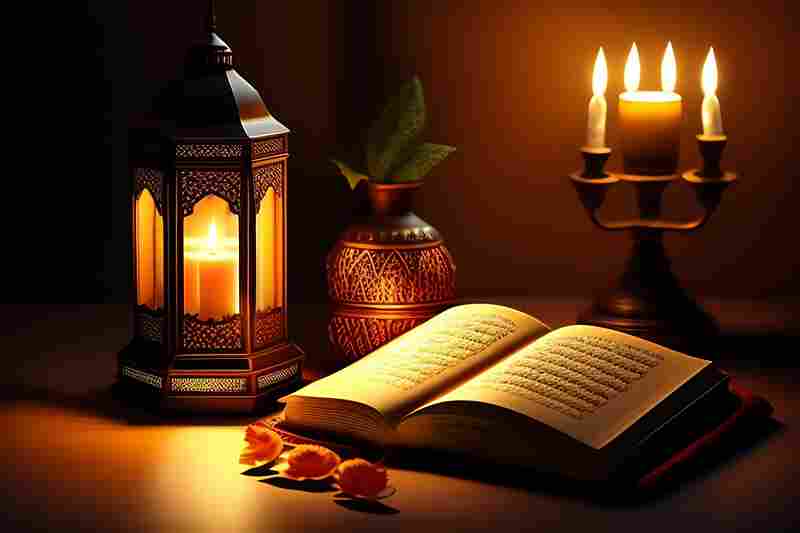Introduction: “The Significance of Marriage:

Embarking on the journey of marital bliss, we unravel the profound insights tucked within eight powerful Quranic verses. Join us in exploring the divine guidance that promises enduring love and unwavering harmony in your marriage. These verses illuminate the path to tranquility and righteousness, offering pearls of wisdom that enrich relationships and foster mutual understanding. Let the divine words of the Quran be your compass, guiding you to a marriage filled with everlasting love and harmonious resonance. Immerse yourself in the transformative power of these verses for a love that stands the test of time.
“Quranic Verses on Union and Prosperity”

“And marry the unmarried among you and the righteous among your male slaves and female slaves. If they should be poor, Allah will enrich them from His bounty, and Allah is all-Encompassing and Knowing.” [24:32]
In this Quranic verse (24:32), Allah emphasizes the importance and virtues of marriage, urging believers to wed the unmarried and righteous individuals. This directive extends to both free men and women, as well as slaves, underlining the universality of the divine command.
The verse underscores that Allah, the Lord of Majesty, promises enrichment from His bounty to those who marry, even if they start with limited means. It particularly addresses the societal norms where individuals may hesitate to marry due to financial concerns. The divine assurance encourages faith in Allah’s providence, as marrying with the intention of maintaining purity and safeguarding against sin brings not only spiritual benefits but also material well-being.
Furthermore, the verse conveys the virtue of marrying in adherence to the Sunnah (traditions) of the Prophet Muhammad ﷺ and in compliance with Allah’s commands. It assures that such marriages, founded on purity, protection from sin, and adherence to Islamic principles, will be blessed with both material prosperity and abundance.
Ibn Abi Hatim narrated from Hazrat Siddiq Akbar (may Allah be pleased with him) that he addressed the Muslims, saying, “Adhere to the command of Allah in getting married, and Allah will fulfill the promise of providing abundance.” Then he recited the verse: “Let them who find not the means for marriage keep themselves chaste until Allah enriches them out of His bounty.” Following this, Hazrat Abdullah bin Masood (may Allah be pleased with him) remarked, “If you desire wealth, then marry, for Allah has said: ‘Let them who find not the means for marriage keep themselves chaste until Allah enriches them out of His bounty.'”
Scholars have remarked regarding this verse that it also alludes to those individuals who, due to concerns about their children’s marriage and financial constraints, refrain from marrying. They may worry that their sons are not earning enough or lack a good source of income, leading them to delay the marriage until a more prosperous time. Consequently, these parents might miss the opportune period of their children’s youth, a time characterized by genuine affection, love, and companionship.
In contrast, when individuals focus solely on accumulating wealth, they risk losing the essence of life’s real moments. This is especially evident when they prioritize financial gains during their youth, only to find themselves arranging marriages in their old age. In doing so, they may have missed the chance to experience the joys of their children’s youth, which is a significant period marked by love and companionship.
Additionally, the verse indicates those individuals who, despite having a poor financial background, may have a son with a limited income or a lack of a significant means of livelihood. If a poor father wishes to arrange a marriage for his son or if a destitute young man desires to seek marital ties, they may face resistance from wealthier families who are hesitant due to financial concerns.
In such cases, if the young man does not possess immediate financial resources but has skills or can engage in work that could potentially provide a livelihood in the future, one should place trust and reliance on Allah’s wisdom. In these circumstances, it is essential to have faith in the generosity of Allah, the Lord of Majesty, and to proceed with the marriage, trusting that Allah will grant both prosperity and sustenance.
In conclusion, individuals should embrace marriages based on faith, trust in Allah, and a sincere commitment to marital values, rather than allowing financial concerns to dictate such significant life decisions. With trust in Allah’s wisdom, it is hoped that He will bestow prosperity and blessings upon those who take the courageous step towards fulfilling this essential aspect of life.
This divine guidance transcends societal norms and financial considerations, emphasizing that the decision to marry should be rooted in faith, trust in Allah’s wisdom, and a commitment to virtuous living. The verse encapsulates the profound wisdom behind the institution of marriage, serving as a beacon for believers to embark on this sacred journey with confidence and reliance on Allah’s divine pla
“Positive Social Interactions: A Quranic Guide for a Happy Family”

"Live with them in a good and kind manner. And if you dislike them, it may be that you dislike something while Allah has placed much good in it." (Quran 4:19)
The natural disposition and thoughts of every individual vary from person to person. While the world is transient and everything does not align with one’s thoughts and desires, the matter of marriage is no different. It is possible that one’s spouse may not be as beautiful as imagined or may have habits that are not preferred. In such situations, Allah advises that if you dislike something about them, it may be that you dislike something and Allah places much good in it. This implies that there could be potential goodness and blessings hidden in situations that may not seem favorable initially. It’s important to exercise patience and tolerance.
Moreover, the verse emphasizes living with spouses in kindness, even if there are differences or dislikes. Allah suggests that through patience, goodness may emerge, or Allah may bring about much good in the disliked situation. This underscores the importance of perseverance and trust in Allah’s wisdom, who, in His infinite knowledge, may turn a seemingly unfavorable circumstance into a source of great blessings.
In essence, the verse encourages believers to adopt a positive and patient approach in marital relationships, acknowledging the diversity of human preferences and the potential for hidden goodness in what may seem unfavorable. Additionally, it highlights the significance of good conduct and patience in maintaining harmonious social relations, drawing examples from the exemplary life of Prophet Muhammad ﷺ, who demonstrated excellent social behavior even in challenging circumstances.
Hazrat Aisha (RA) reported: The Messenger of Allah (PBUH) said, "The best among you is the best for his family, and I am the best for my family. When your companion dies, leave him alone." (Narrated by Tirmidhi and Darimi)
Hazrat Aisha (RA) reported: Once, while she was with the Messenger of Allah (PBUH) during a journey, she said, "I raced with him on foot, and I outstripped him. When I became fleshy and gained some weight, I raced with him again, and he won. He said, 'This makes up for that.'" (Narrated by Abu Dawood, Mishkat ul Masabih #3252)
Narrated 'Urwa: Aisha said, While the Ethiopians were playing with their small spears, Allah's Apostle screened me behind him and I watched (that display) and kept on watching till I left on my own. So you may estimate of what age a little girl may listen to amusement. Sahih Bukhari#5190
Hazrat Aisha (RA) narrates that when the Prophet Muhammad (PBUH) returned from the Battle of Tabuk or the Battle of Hunain, there was a curtain over her alcove. When the wind blew, it uncovered Aisha's dolls and toys. The Prophet (PBUH) asked, "Aisha, what is this?" She replied, "They are my dolls." He then uncovered a horse with wings made of cloth. The Prophet (PBUH) asked, "What is this that I see among them?" She answered, "A horse." He inquired, "And what are these on it?" She responded, "Two wings." The Prophet (PBUH) said, "A horse with wings?" She replied, "Did you not hear that Solomon had horses with wings?" At this, the Prophet (PBUH) smiled so broadly that I could see his molars. (Narrated by Abu Dawood, Mishkat ul Masabih #3265)
Love and Tranquility: The Foundation of a Strong Marriage

"And of His signs is that He created for you from yourselves mates that you may find tranquility in them and He placed between you affection and mercy. Indeed in that are signs for a people who give thought."
In this blessed verse, Allah, the Lord of Majesty, points towards a crucial aspect of married life. He created pairs from among yourselves, endowing both men and women with distinct habits, qualities, temperaments, and interests. By doing so, He facilitated a connection between them, fostering mutual understanding and compatibility. When we delve into the fundamental qualities associated with women, we discover that it fosters a feeling of serenity and heartwarming comfort. Therefore, it is evident that the core of marital relationships is rooted in the emotional peace and comfort one shares with their spouse. When we contemplate the essential qualities of women, encompassing their nature, temperament, and other attributes, it becomes evident that the genuine source of marital happiness lies in the emotional tranquility and satisfaction it provides. Even if there is wealth and material abundance in a relationship, without this emotional harmony, the marriage may lack true happiness.
In emphasizing the importance of these qualities, Allah, in His infinite wisdom, mentions the terms of affection, love, and mercy in the context of marriage. It signifies that, especially in the youthful years when the need for love and affection is pronounced, Allah has granted both men and women the attributes of mutual love and mercy. The mention of mercy becomes more prominent in later years when individuals may require compassion and understanding.
In essence, the verse highlights that the heart’s tranquility and emotional comfort are the essence of a marital bond. If, God forbid, these elements are absent in a relationship, despite material wealth and other apparent factors, the marital union may not be as fulfilling. Thus, Allah, in His divine wisdom, has specifically mentioned the presence of affection, love, and mercy as fundamental components of the marital relationship.
How to Build Strong Family Ties:

“O mankind! Be careful of your duty to your Lord who created you from a single soul and from it created its mate and from them twain hath spread abroad a multitude of men and women. Be careful of your duty toward Allah is Whom ye claim (your rights) of one another, and toward the wombs (that bare you). Lo! Allah hath been a watcher over you.” Quran (4:1)
The blessed verse instructs people to be mindful and observant of their Lord, who created them from a single soul and then created from it its mate. From the pair, He dispersed countless men and women. The command emphasizes the importance of God-consciousness and maintaining family ties.
In the context of this verse, scholars elaborate that when Adam (peace be upon him) was created, he initially was one being. Then, Allah, in His wisdom, created Hawwa (Eve) from Adam’s left rib. When Adam opened his eyes and saw Hawwa, he found her pleasing, and she found him pleasing as well. From this union, the rest of humanity was subsequently created.
The hadith further explains that women were created from a rib, and the most crooked part of the rib is its upper portion. Therefore, if you try to straighten it, it will break, but if you enjoy it with its crookedness, you will benefit from it while accepting its inherent nature.
In essence, this verse and the accompanying hadith highlight the divine wisdom in the creation of men and women, emphasizing the importance of maintaining piety, being thankful for familial relationships, and appreciating the inherent characteristics of each gender.
Marriage and Morality: The Quran’s Guidance on Multiple Wives

"And if you fear that you will not deal justly with the orphan girls, then marry those that please you of [other] women, two or three or four."( Alnoor:3)
In the context of the blessed verse, it is explained that before the advent of Islam, people used to engage in practices where if there were orphan girls under their guardianship, they would marry them off either to themselves or to their own sons. However, in this practice, they would often neglect giving them their due rights and neglect providing a proper dowry. In the terminology used, orphan girls refer to underage girls whose parents are not alive. The guardians of such girls had the right to marry them off, but it was necessary to exercise caution and consider the future of the girl.
It was not permissible to exploit the situation by marrying a girl to an older man or for some other unwarranted reasons. Hence, the ruling was established that if one cannot fulfill the rights and responsibilities towards these orphan girls, then they are allowed to marry other women. This could be one, two, three, or four women, provided that justice and fairness are maintained. If one cannot maintain justice among them, then it is better to confine oneself to only one marriage. Before Islam, there are instances of individuals having multiple wives, and the Prophet Muhammad (peace be upon him) directed them to keep four and divorce the rest. Equality is essential; it is not permissible to marry multiple wives if one cannot fulfill the rights of all equally, and it would be unjust and result in severe consequences on the Day of Judgment.
The hadith narrates that if someone has two wives and does not treat them equally, he will come on the Day of Judgment with one side of his body sagging. Therefore, fairness and equality are crucial in matters of sustenance and cohabitation. However, Sharia allows flexibility when it comes to emotional bonding, leaving it to the discretion of the individual. The Prophet Muhammad (peace be upon him) stated, “O Allah, this is my division in those matters that are within my control. Now, the things in Your control, don’t hold me accountable for them.” It is evident that if the matter is beyond the control of the Prophet Muhammad (peace be upon him), it is not binding on us either because Allah, the Lord of Majesty, Himself has stated that you cannot establish complete justice between your wives, even if you desire it sincerely. Therefore, the emphasis is on maintaining justice and not exploiting the choice that is beyond human control.Divine Matchmaking: The Law of Attraction in Relationships

“Wicked women (are) for wicked men, and wicked men (are) for wicked women; and good women (are) for good men, and good men (are) for good women. Those are (declared) quit of whatever they (i.e., of what the wicked ones say) say; they will have forgiveness and an honorable provision.” Quran (24:26)
This blessed verse, provides profound insights. It establishes a fundamental principle that humans, by nature, incline towards those who share their habits and temperament. Just as individuals inclined towards intoxication or drinking tend to associate with like-minded individuals, everyone naturally gravitates towards the company of those who align with their nature.
Here, Allah, the Lord of Majesty, is conveying the understanding that wicked women find compatibility with wicked men, and similarly, wicked men are drawn to wicked women. Conversely, good women naturally attract good men, and virtuous men are inclined towards good women. This serves as a universal guideline reflecting the innate inclination of individuals towards those who share their virtues or vices.
The verse prompts us to introspect and consider who we choose as companions. It underscores the importance of surrounding ourselves with individuals whose character resonates with our own. It’s a reminder that, just as the saying goes, “You are known by the company you keep,” our choice of friends and associates reflects and influences our own character.
In essence, the verse encourages individuals to seek virtuous companionship and distance themselves from those whose moral values are contrary. It’s a timeless wisdom reminding us to be mindful of the company we keep, as it profoundly shapes our character and influences our path in life.
Spousal Harmony:
"They are clothing for you, and you are clothing for them." ( AlBaqarah:187)
The verse is part of the guidance provided regarding the permissibility of intimate relations during the nights of fasting in the month of Ramadan. The complete verse is: “…They are clothing for you, and you are clothing for them.” This metaphorical expression emphasizes the intimate and protective nature of the marital relationship. The analogy of clothing signifies the close and protective bond between spouses. Just as clothing provides physical protection and adornment, spouses are meant to offer one another emotional support, companionship, and a sense of security. The verse underscores the mutual rights and responsibilities in a marital relationship, promoting a harmonious and balanced partnership where both husband and wife contribute to each other’s well-being.
“A Heartfelt Supplication: Finding Comfort in Spouses and Offspring”

“Our Lord, grant us from among our spouses and offspring comfort to our eyes and make us an example for the righteous.” Quran (25:74)
In this blessed verse, the qualities of the pious are highlighted as they not only concern themselves with the affairs of the Hereafter but also pray ( How to Make a Good Dua ) for the righteousness and well-being of their spouses and offspring. The term “coolness of the eyes” implies that every virtuous person desires to see their children engaged in righteous deeds and goodness. The rectification and goodness of the children bring peace and tranquility to the parents, and the serenity in the eyes of the spouses signifies the comfort and ease obtained from their well-being.
It is a common aspiration for every noble individual to witness their children involved in acts of virtue and piety. The righteousness of the offspring not only brings solace to the parents but also becomes a source of inner peace and contentment. This is further emphasized by a narration where seeking refuge from an elderly and troublesome wife and praying against troublesome children is discouraged. Hence, a faithful believer should consistently supplicate for the rectification and righteousness of their family, seeking tranquility in the well-being of their loved ones.
The engagement of a Muslim in prayers for the well-being and righteousness of their family is not only an expression of love but also a recognition of the profound impact that familial goodness has on one’s own peace of mind. It emphasizes the interconnection between individual spirituality and the spiritual welfare of the family unit. In essence, this verse encourages believers to aspire for a harmonious family life, where the coolness of the eyes is derived not only from personal piety but also from witnessing the virtue and goodness of one’s own kin.
Plz share …






I don’t think the title of your article matches the content lol. Just kidding, mainly because I had some doubts after reading the article.
what kind of doubts Brother
Can you be more specific about the content of your article? After reading it, I still have some doubts. Hope you can help me.